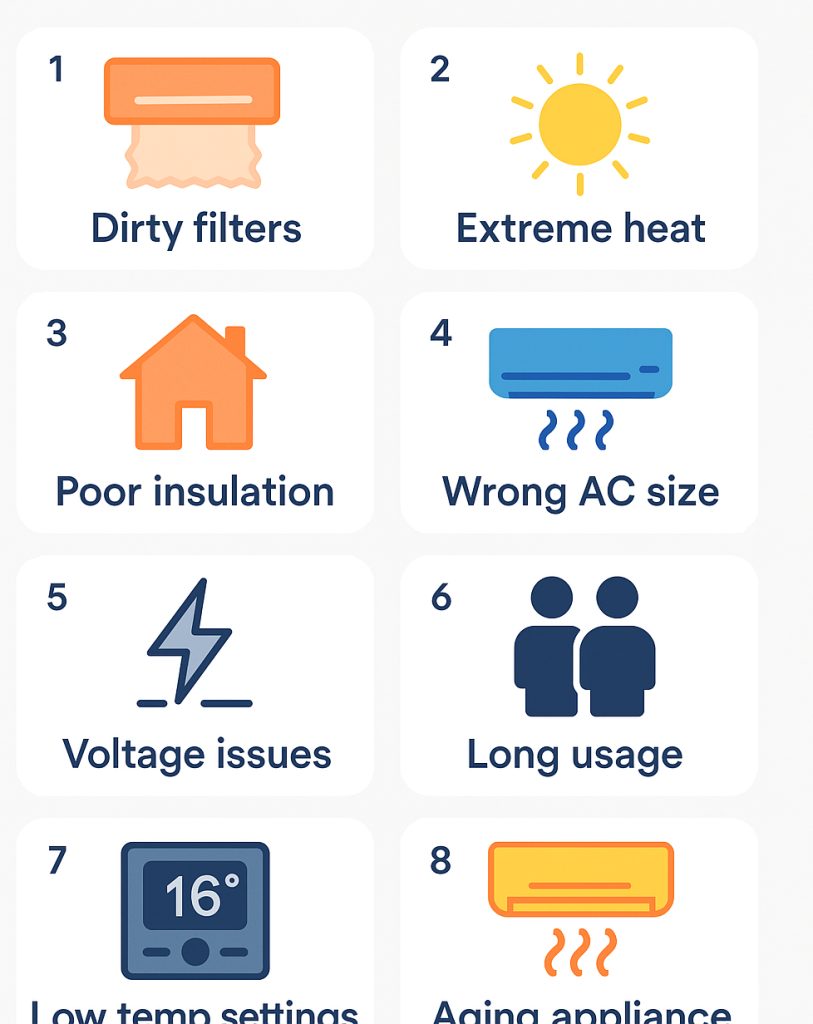Air conditioners are essential in many homes, especially during the sweltering summer months. But when the electricity bill arrives, many people are shocked to find their AC using way more power than expected.
Why does this happen? And how can you fix it?
In this article, we’ll uncover the main reasons behind higher-than-estimated AC power consumption, and give you practical tips to reduce energy use without compromising on comfort.
⚠️ Why Estimated AC Power Usage Can Be Misleading
Manufacturers provide energy usage estimates based on ideal lab conditions:
- A moderately-sized, well-insulated room
- Stable voltage supply
- Low humidity
- Standard runtime (usually 8 hours/day)
In real-life scenarios, these conditions often don’t apply. External heat, poor insulation, usage patterns, and maintenance issues can all lead to higher electricity consumption.
🔧 1. Lack of Regular Maintenance
One of the biggest culprits is neglecting AC maintenance. Dirty filters, clogged coils, or low refrigerant levels can force your unit to work harder, increasing energy consumption by up to 20–30%.
Fix:
- Clean filters monthly
- Schedule professional servicing every 6–12 months
- Check for refrigerant leaks or blocked drain lines
🌡️ 2. Extreme Temperatures Outside
ACs use more energy on extremely hot days. The hotter it is outside, the longer your AC runs to maintain indoor comfort.
Tip:
- Close curtains or blinds during the day
- Avoid heat-generating appliances (like ovens) when the AC is running
🏠 3. Poor Room Insulation
If cool air is escaping or hot air is seeping in, your AC will keep running longer—wasting energy.
Common Problem Areas:
- Gaps in windows and doors
- Uninsulated walls or ceilings
- Thin window glass
Fix:
- Use weatherstripping and thermal curtains
- Seal gaps around doors and windows
📐 4. Wrong AC Size
If your AC is too small for the room, it struggles to cool and runs constantly. If it’s too big, it cools quickly but cycles inefficiently.
Ideal AC Size by Room:
| Room Size (sq. ft.) | AC Capacity |
|---|---|
| 100–150 | 0.75 Ton |
| 150–250 | 1.0 Ton |
| 250–400 | 1.5 Ton |
| 400–600 | 2.0 Ton |
Fix:
Consult a technician or use a BTU calculator before buying your AC.
⚡ 5. Voltage Fluctuations
Unstable voltage can make your compressor restart frequently, increasing energy use and damaging components.
Fix:
Use a voltage stabilizer or surge protector, especially in areas with an unreliable power supply.
👥 6. Heavy Usage or More People in the Room
More people generate more body heat. If you’re running the AC for long hours, or the room is crowded, energy use will naturally rise.
Tip:
- Use smart plugs or a programmable thermostat to schedule AC usage
- Run ceiling fans to circulate air more efficiently
🧊 7. Thermostat Settings
Many users set the thermostat to 16–20°C thinking it’ll cool faster. In reality, this just increases power consumption unnecessarily.
Ideal Setting:
Keep your thermostat at 24–26°C for a comfortable and energy-efficient environment.
🔢 8. Aging or Outdated AC
Even 5-star rated ACs degrade over time. A 5-year-old AC may now be working as inefficiently as a 2-star model due to wear and tear.
Fix:
- Consider upgrading to an inverter AC with a high ISEER rating
- Look for the latest BEE star ratings before purchasing
📉 How to Track and Reduce AC Power Consumption
Tools You Can Use:
- Smart plugs with kWh tracking (e.g., Wipro, TP-Link)
- Energy monitors like Emporia or Sense
- Electricity bill comparison over months
Quick Energy-Saving Tips:
✅ Use “Eco Mode” if available
✅ Keep doors and windows closed while AC is on
✅ Combine AC with fans for better airflow
✅ Avoid frequent temperature changes
✅ Schedule usage during non-peak hours
🧠 Final Thoughts
Your air conditioner doesn’t have to be a power hog. By understanding the reasons behind excessive energy consumption and taking proactive steps, you can stay cool without shocking your wallet.
👉 Regular maintenance, smart usage habits, and a well-sized AC can make a big difference.
Did this article help?
👍 Leave a comment or share your own tips below!
📬 Subscribe www.energypurse.com for more energy-saving tips delivered straight to your inbox.
For most affordable 1.5 ton inverter ac click here, for Best energy efficient 1.5 ton window AC click here, For All weather air conditioners of 1.5 TR click here, For best air cooler click here, For Best energy efficient ceiling fans click here












